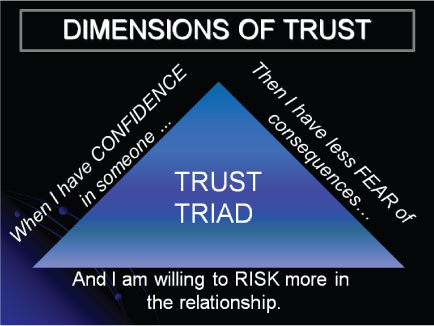Trust – In A Project Based Environment
By George Vukotich
As more work is done on a project basis where teams come together to create or develop something and then move on, it is increasingly important to get teams up to speed quickly. This involves having team members work from a common frame of reference that includes everything from ensuring individuals understand their roles and responsibilities to understanding how decisions will be made and acted on. While it may sound easy, more projects fail because of a lack of understanding between team members than a lack of talent of the team members.
Communication is often cited as the main challenge in getting people to work together. The person giving direction usually has a clear understanding in his or her mind what they want, but often the person receiving the information, for a number of reasons, may not understand what is expected of them. The individual receiving the communication for fear of appearing foolish will not ask for clarification. What is at the heart of the matter is an individual’s dignity (how they feel about themselves and what they think others will think of them). They feel if they ask questions or say they don’t know it will reflect poorly on them.
These perceptions come about as a result of a number of cultural issues that have developed in organizations and a lack of trust. Individuals want to be seen as competent and having the ability to do a good job and don’t want that image hurt. Those who do risk asking questions and asking for clarification or help may be seen as weak. Even worse they may be humiliated for showing they don’t know. In one case where the author was present an individual went to his manager and asked for clarification on how to create data to input for a new process. The manager’s initial response was, “The information is on the Intranet.” I’m sure many of you can relate. Depending on the company the Intranet can be a big place with information that is not always easy to find. To further compound the issue in this case the individual came back a short time later and told the manager he could not find the information on the Intranet. To which the manager’s response was, “Any idiot should be able to find it.” Now this may be an extreme case, but one that does happen. The issue is that the individual may never receive the information they need to do their job which resulted in a cost in time, morale, and maybe even quality. An even greater problem is that in this type of environment individuals having questions and needing help will not look to others. They will go along and “hope” for the best. Survival is the goal. These cultures are based on “not making a mistake” vs. those of more progressive organizations that want to “do the best job possible.”

In organizations where individuals have relationships based on “trust” and can openly ask questions, collaboration and effectiveness are greatly increased, not to mention the increased productivity and morale from having a greater sense of belonging in the organization they are part of.
Think of it this way; when I have confidence that the person I am working with has my best interests in mind, then I have less fear of negative consequences, and I am open to risking more in the relationship and trying more on the job.
Building trust starts with individuals having a common understanding of what the organization is trying to accomplish and their role in it. Understanding what motivates others sets the stage for mutually beneficial relationships. Next time you start a project take the time to:
- Clarify the goal of the project so everyone knows what it is.
- Specify how success will be measured in terms of deadlines and what the measures of success are.
- Identify everyone’s strengths and define everyone’s role in the project.
- With the group determine how best to communicate information to the team.
- Specify how decisions will be made.
While everyone wants to get to work on a project, showing what they can do as individuals, it helps to take some time up front to build relationships and set the tone for not only what, but how things will be done.
About the Author
George Vukotich, Ph.D. is the Department Chairperson for the Graduate Program in Training and Development at Roosevelt University. He has spent his career in consulting and corporate environments helping individuals and teams be more effective. His newest book, “Breaking the Chains of Culture – Building Trust in Individuals, Teams, and Organizations” focuses on building successful relationships based on trust. Breaking the Chains of Culture – Building Trust in Individuals, Teams, and Organizations is available at Amazon.com George can be reached at gvukotich@roosevelt.edu.